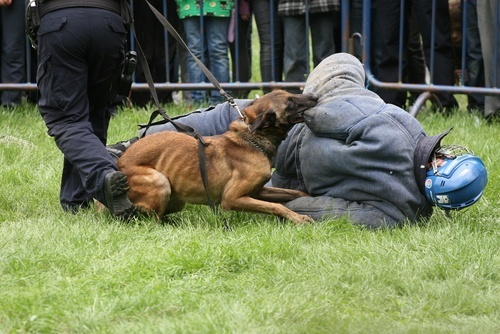Victims attacked by police dogs in Las Vegas can sometimes bring a Section 1983 lawsuit against law enforcement for violating their civil rights. If the court finds that the police dog bites were an excessive use of force, victims may recover compensatory damages for their:
Victims may also be eligible to have their attorneys’ fees reimbursed. And if the police acted in a malicious way, the court may even award them punitive damages.
In this article, our Nevada personal injury attorneys discuss:
- 1. What are police dogs used for in Nevada?
- 2. Are police dog bites excessive force?
- 3. Can I sue for police dog bites?
- 4. Whom can I sue?
- 5. Do the police have qualified immunity?
- 6. What is the statute of limitations to sue for K-9 bites in Nevada?

People bitten or mauled by law enforcement dogs in Nevada may be able to sue for civil rights violations.
1. What are police dogs used for in Nevada?
Police stations throughout Nevada maintain a “K-9 Unit” of specially trained Belgian Malinois and German Shepherds to aid officers in their duties. Because of their keen sense of smell, these trained dogs are valuable policing aids for:
- tracking suspects,
- finding cadavers,
- searching for survivors,
- detecting narcotics and bombs, and
- locating contraband such as guns
And in some situations, police may use dogs to help apprehend uncooperative suspects. In addition to being intimidating, these police dogs have teeth with a bite pressure of hundreds of pounds per square inch. Getting bitten or mauled by a police dog can cause critical injuries or even death.
The following local police departments in Nevada have K-9 Unit websites with photographs of their dogs:
- Las Vegas Metropolitan Police Department (LVMPD) K-9 Unit
- Henderson Police Department K-9 Unit
- Washoe County Sheriff’s K-9 Unit
- Reno Police Department K-9 Unit

A police K-9 dog attack is arguably a breach of 4th Amendment rights.
2. Are police dog bites excessive force?
The Fourth Amendment protects people from unreasonable searches and seizures by the government. Police may rely on dogs in furtherance of their duties as long as the police dog force is reasonable.
Clearly, getting bitten by a police dog is a pretty severe seizure of one’s person. Courts determine whether police dog force is reasonable or excessive by balancing the following two considerations against each other:
- the nature and quality of the government’s intrusion of the suspect (the dog bite and resulting injuries), and
- the government’s interest at stake (the urgency of having the suspect apprehended)1
Some of the factors courts may consider when deliberating over the legality of the police dog force may include:
- whether the victim was suspected of a serious or minor offense
- whether the victim was armed and dangerous
- the importance of having the victim in custody as soon as possible
- whether the victim was fleeing or resisting arrest
- the extent of the dog bite injuries, the number of bites, and how long the dog held the bite
- whether the dog obeyed the police’s commands
- whether the victim was cooperative or combative
- whether the victim provoked the dog
- whether the police warned the victim before siccing the dog on the victim
- whether the police could have used less violent ways to apprehend the victim
- whether the police acted maliciously when unleashing the dog on the victim2
2.1. Deadly force
Police may use deadly force such as gunfire in only limited circumstances, such as to stop a dangerous suspect from fleeing or in self-defense. Even though police dogs can cause death, Nevada law has never classified police dogs as “deadly force”.
Therefore, police presumably may employ dogs in the same way they may resort to lesser forms of force such as tasers, batons or pepper spray. As discussed in the previous subsection, police just have to make sure their use of the dogs is reasonable under the circumstances.
Note that there are situations where it may be reasonable for police to use their dogs as deadly force. For instance, if a suspect is armed and trying to kill the officer, directing the police dog to maul the suspect may be a legal use of deadly force.3

Plaintiffs in Section 1983 lawsuits may receive compensatory damages for K-9 bites.
3. Can I sue for police dog bites?
Police dog bite victims can try to sue under 42 U.S.C. Section 1983 alleging that the police violated their Fourth Amendment rights against unreasonable searches and seizures.4 If successful, the plaintiff can win compensatory damages to pay for all their:
- medical bills,
- pain and suffering,
- lost wages, and/or
- loss of future earnings
If law enforcement officers acted maliciously, the court can order the plaintiff to receive punitive damages as well. Finally, the court can order that the defendants pay the plaintiffs’ attorneys’ fees.5
Note that many civil lawsuits such as Section 1983 claims never reach trial because the parties negotiate and settle out of court. For instance, a Reno man recently secured a $17,500 settlement after being mauled by a law enforcement dog after he had already surrendered to authorities.6

Dog bites can cause deep puncture wounds and other serious injuries. And the use of dogs is often unnecessary for public safety.
3.1. Other causes of action
Depending on the case, a personal injury attorney can look into suing for other claims such as negligence or intentional infliction of emotional distress. But note that these types of lawsuits are more winnable if the victim is an innocent bystander and not a criminal suspect.
Note that Nevada’s criminal laws regarding the “one-bite rule,” “dangerous” dogs, and “vicious” dogs do not apply to law enforcement animals. Therefore, handlers of police dogs who have bitten someone usually will not face criminal charges unless the handlers acted outside the scope of their employment.7]
Learn more about suing for dog bites and Nevada dog bite laws.
4. Whom can I sue?
Law enforcement dog bite victims can potentially bring Section 1983 claims against the following defendants:
- The police officer or sheriff’s deputy in charge of the dog that bit the victim,
- The police chief or sheriff,
- The police or sheriff’s department, or
- The city or county where the law enforcement department is located
Predictably, the law enforcement department and municipality have far deeper pockets than individual law enforcement officers and may offer more general settlements.

Law enforcement may try to escape civil liability by claiming qualified immunity.
5. Do police have qualified immunity?
Law enforcement officers often have “qualified immunity in Nevada,” which protects them from liability in certain civil cases like Section 1983 lawsuits. Qualified immunity is essentially a presumption that the police executed their duties reasonably and in good faith…
Therefore, plaintiffs in police dog bite lawsuits would try to demonstrate that the police’s actions fell outside the bounds of reasonableness and good faith. Typical evidence that figures in these cases includes surveillance video, body camera (bodycam) video, medical records, police reports, and eyewitnesses.
6. What is the statute of limitations to sue for K-9 bites in Nevada?
Law enforcement dog bite victims usually have two (2) years from the date of the injury to bring a Section 1983 lawsuit.8 But all cases are unique, so it is important to consult with a personal injury attorney to help determine legal options and time frames.

Call our law firm for legal advice. We offer free consultations.
Also see our articles on suing for police misconduct in Nevada and the Nevada crime of keeping a vicious dog (NRS 202.500).
Injured in California? See our article on suing for California police dog bites.
Legal References:
- Graham v. Connor, (U.S. Supreme Court, 1989) 490 U.S. 386 (“Determining whether the force used to effect a particular seizure is “reasonable” under the Fourth Amendment requires a careful balancing of ‘the nature and quality of the intrusion on the individual’s Fourth Amendment interests’ against the countervailing governmental interests at stake. Our Fourth Amendment jurisprudence has long recognized that the right to make an arrest or investigatory stop necessarily carries with it the right to use some degree of physical coercion or threat thereof to effect it…. its proper application requires careful attention to the facts and circumstances of each particular case, including the severity of the crime at issue, whether the suspect poses an immediate threat to the safety of the officers or others, and whether he is actively resisting arrest or attempting to evade arrest by flight.”).
- See Mendoza v. Block, (9th Cir. 1994) 27 F.3d 1357 (“We do not believe that a more particularized expression of the law is necessary for law enforcement officials using police dogs to understand that under some circumstances the use of such a “weapon” might become unlawful. For example, no particularized case law is necessary for a deputy to know that excessive force has been used when a deputy sics a canine on a handcuffed arrestee who has fully surrendered and is completely under control. An officer is not entitled to qualified immunity on the grounds that the law is not clearly established every time a novel method is used to inflict injury.”).
- See Smith v. Hemet, (9th Cir. 2005) 394 F.3d 689 (“We need not here determine whether the use of a police dog to subdue a suspect constitutes deadly force generally or the circumstances under which such use might constitute such force. Having announced the definition of “deadly force” we leave to the district court the first opportunity to apply the concept to the facts of this case. We note only that while we have not in any of our prior cases found that the use of police dogs constituted deadly force, we have never stated that the use of such dogs cannot constitute such force.”).
- 42 U.S.C. § 1983 (“Every person who, under color of any statute, ordinance, regulation, custom, or usage, of any State or Territory or the District of Columbia, subjects, or causes to be subjected, any citizen of the United States or other person within the jurisdiction thereof to the deprivation of any rights, privileges, or immunities secured by the Constitution and laws, shall be liable to the party injured in an action at law, suit in equity, or other proper proceeding for redress, except that in any action brought against a judicial officer for an act or omission taken in such officer’s judicial capacity, injunctive relief shall not be granted unless a declaratory decree was violated or declaratory relief was unavailable. For the purposes of this section, any Act of Congress applicable exclusively to the District of Columbia shall be considered to be a statute of the District of Columbia.”).
- 42 U.S.C. § 1988.
- Anjeanette Damon, Reno man mauled by police dog to get $17,500 settlement, Reno Gazette-Journal (August 15, 2017). See also The Marshall Project (tracking police dog bites in St. Louis County, Los Angeles, the Bay Area/San Francisco, Alabama, and Florida). See also Video Shows Missouri Officers Let Police Dog Bite Black Man, The Associated Press (September 22, 2021)(“Officers in Woodson Terrace, a city of about 4,000 people near St. Louis Lambert International Airport, were advised at 7:18 a.m. Monday that a man had broken into a business…The cellphone video shows the dog biting the man’s foot as he yells out in pain. The dog’s handler holds it by a leash but allows the biting to go on for about 30 seconds…Officers then handcuff the man, who seems to be barely able to walk as he is led to a squad car.”). See also FBI Working Dogs.
- NRS 202.500.
- NRS 11.190.

